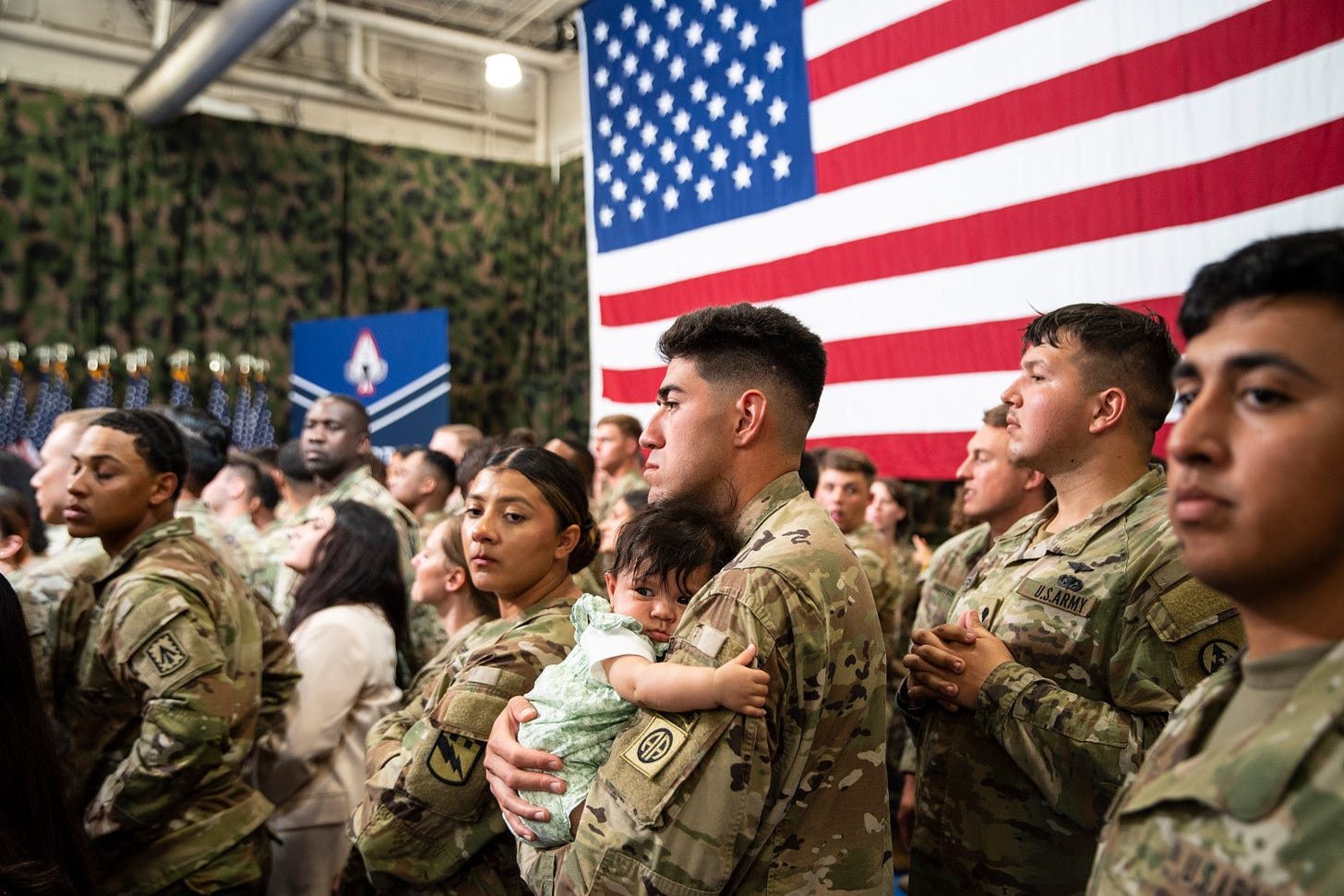
THE WAR IN AFGHANISTAN ENDED two and a half years ago, yet the United States Armed Forces are as busy as ever, at least as measured by how much time service members are spending away from home. That’s partially because the United States is fielding its smallest military in eighty years, despite being involved (in various capacities) in multiple conflicts around the world. The Department of Defense is providing critical logistical, maintenance, and advisory support to Ukraine in its existential fight against Putin’s Russia, while also arming Israel in its struggle against Hamas. Next door, American forces in Iraq and Syria work to keep the Islamic State from reemerging while parrying blows from Iranian proxies. On January 28, those blows turned deadly, as a drone apparently launched by Iranian proxies killed three American soldiers in Jordan. Meanwhile, a few hundred miles south, the Navy is keeping vital sea lanes open as it battles the Houthis. While juggling all these responsibilities in different active theaters, the U.S. military is also trying to deter Chinese irredentist claims in the South China Sea.
Each of these crises is exacerbated by the military’s biggest long-term challenge: It can’t recruit enough people to meet its needs. No wonder its personnel are all run ragged.
In 2023, the Army, Air Force, and Navy failed to meet their recruiting goals, while the Marine Corps barely met their mark. Despite messaging campaigns, raising the maximum enlistment age, and happy talk from the Pentagon, the recruiting crisis shows no signs of abating. Confidence in the military is at a two-decade low. A paltry 21 percent of 18-to-34-year-olds are eligible to serve due to poor physical fitness, drug use, or other mental or physical health issues. Just 9 percent of 16-to-21-year-olds say they would consider joining the military, and only 54 percent of Americans would recommend they do so.
The causes of the recruitment crisis are almost too numerous to count. Recruiting numbers often dip when the economy is strong and potential recruits have more lucrative options, as is the case today. Also, as the size of the military shrinks, the civilian-military social and cultural gap widens, especially among those eligible to serve. Only 12 percent of young Americans believe they have much in common with the military, partly explaining why, in 2019, only 27 percent of young Americans could name all five services. (Since the founding of the U.S. Space Force later in 2019 there have been six armed services, and the percentage of Americans who can name them all has surely fallen further.) The COVID-19 pandemic not only forced recruiters to use ineffective virtual media, but also exacerbated potential recruits’ physical and mental health issues. Meanwhile, the military’s inability to curb sexual assaults and suicides combined with overheated political rhetoric that paints the military as woke or filled with violent extremists makes it a challenge for recruiters to explain why military service might be beneficial to a young person. And on top of it all, recruitment offices are short-staffed.
The list of reasons recruitment is so difficult at the moment could go on and on, but arguably the most fundamental problem involves veterans’ views of the military. Veterans are often the military’s most effective recruiters—especially of their family members. The American military is predominantly a family affair, with 80 percent of service members hailing from military families. Yet only 63 percent of veterans would recommend enlisting in the military, a 12-point drop from 2019. While the difficulties veterans encounter transitioning back into civilian life and the persistent problems with the Department of Veterans Affairs both contribute to veterans’ disenchantment with the military, America’s humiliating defeat in Afghanistan and the unsatisfying ending (if it can be called that) in Iraq are underappreciated issues. Senior military officials must start addressing the legacies of those wars or risk losing the respect and support of many Iraq and Afghanistan veterans for good.
AFTER MY RETIREMENT CEREMONY earlier this month, I had the chance to catch up with a buddy who retired about five years ago. We had served together in Afghanistan in 2008. As a retired senior noncommissioned officer with two kids of prime recruitment age, he’s the type of veteran with the type of family the military needs to help replenish their ranks.
But that’s not happening.
“Yeah, they were interested in serving. One even did JROTC in high school,” he told me over lunch, referring to the Junior Reserve Officer Training Corps. “But they saw what Afghanistan did to me. And they want no part of the military now.”
Conversations like this one are happening with frightening frequency. I’ve had them with superiors, peers, and subordinates. In July 2023, I admitted myself into Strong Hope, a military mental health program for patients with combat PTSD, moral injury, and traumatic brain injuries. My fellow patients, nearly all of them Iraq and Afghanistan combat veterans with numerous deployments, expressed disdain and contempt for senior military officials over a lost war. Most were reluctant to see their children join up.
“Look at what all these deployments did to me,” one fellow patient told me during a late-night conversation. “I don’t want this for my children. I won’t let them get a hold of their lives.”
The perception that a private who loses a rifle gets into more trouble than a general who loses a war is widespread in the military. It is hard not to see why. While many Iraq and Afghanistan veterans struggle with myriad issues, including drug abuse and homelessness, retired general officers—those responsible for our defeat in Afghanistan and the disaster in Iraq—rake in lucrative jobs with defense contractors and even foreign countries.
While complaining about senior officers is a time-honored military tradition, the lack of accountability makes recent complaints more pernicious, widespread, and convincing. American generals are often relieved for moral lapses or criminal charges, but in the past quarter century they have rarely been relieved for combat ineffectiveness. For example, no one has been held accountable for the disastrous noncombatant evacuation operations in Afghanistan, let alone the Taliban’s triumphant victory.
Despite pleas from well-respected voices in the veterans community, the military has barely addressed the effects the Global War on Terrorism had on the force. Other than ambiguous statements filled with euphemisms about “the wounds of war, to body and to soul,” only a few leaders have called for an “honest evaluation” of the last twenty years. It took Mark Milley, the former chairman of the Joint Chiefs of Staff, two years even to say, “in a broader sense, the war was lost.” Perhaps one day in the not-too-distant future, someone can state the truth without qualifiers: The Taliban, with the help of its Pakistani allies, defeated the United States, NATO, and our Afghan allies.
What veterans need is frank talk and validation of their honorable service, not euphemisms and evasions. Many veterans are bitter over our dishonorable hightail from Afghanistan. They are angry about the abandonment of our Afghan allies. Most do not feel the Iraq War was “worth it” and have conflicted feelings about their service, which explains the spike in calls to the VA crisis line on the twentieth anniversary of the invasion of Iraq.
Veterans’ family members are also upset. Those whose veterans returned home safely are unquestionably happy. However, many have had to act as caretakers to veterans wrestling with our dishonorable exit from Afghanistan. The moral trauma from Afghanistan nearly destroyed my marriage. Only regular couple’s therapy sessions and being admitted to an intensive inpatient treatment program saved it.
Senior military officials and retired general officers must step into the breach. First, they could state the obvious: The so-called “forever wars” exposed systemic problems both inside the military and in the relationship between the military and the broader society. Why, many veterans and civilians are asking, should America’s parents entrust their children’s lives to an institution that cannot admit failure?
The lessons to be learned from two decades of war are not mysteries. The special inspector general for Afghan reconstruction has a litany of them. Like most institutions, the military has not always welcomed critical analysis—that needs to change. Senior officials should publicly pledge to implement the recommendations of the new Afghan War Commission—and Congress must ensure that they follow through.
Veterans must hear repeatedly and publicly from retired general officers, who can speak freely and honestly. Former senior leaders will have to do more than write columns for elite publications. Instead, they should go where Iraq and Afghanistan veterans gather. They can help raise awareness of veterans’ issues and admit their culpability in what went wrong. But most importantly, they must help veterans think about, talk about, and, yes, grieve these wars, and remind veterans repeatedly that they are not responsible for how the wars ended.
The legacies of the Iraq and Afghanistan wars will remain hurdles for military recruiters to overcome for many years. But a public reckoning and a pledge to learn from our mistakes—something we didn’t do after Vietnam—would help regain public confidence and alleviate some of our recruiting problems.
More importantly, it’s the right thing to do.





